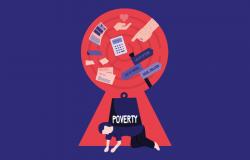“Nothing about us, without us, is really for us.”

“Fourteen million people live in poverty, one and a half million of them in destitution, four in ten children are poor, food banks proliferate, homelessness and rough sleeping are on the rise, life expectancy is falling for women born in deprived areas… And all of it despite historically high employment levels. The conclusion is both clear and bitter: Deep cuts to public services do not work and work does not pay for too many people.”
The day when the UN Special Rapporteur on Extreme Poverty and Human Rights, Philip Alston, presented his UK report in front of the Human Rights Council, 50 civil society leaders signed an open letter last June that included the statement above.
The point is clear, the analysis is pertinent, and the data is deafening.
But it is not enough.
Sowing the seeds of a free and fair society requires different policies, but it also asks gatekeepers and power-holders to listen more.
This is the most fundamental lesson I have learned in recent years: There is no better way to defend social rights than to hand over a megaphone to the people most affected by inequality, public spending cuts and social exclusion.
To mark the beginning of the week of the International Day for the Eradication of Poverty, today a full-day event organised by Just Fair, Amnesty International and ATD Fourth World is bringing together people with lived experience of poverty, scholars, campaigners and researchers to understand poverty and social rights through lived experience.
The event marks the UK launch of a new report co-authored by academics from the University of Oxford and people with lived experience of poverty from ATD Fourth World, people like Amanda and Moraene, who was a social rights activist when I was in my nappies.
The UK report is part of an international series that documents surprisingly similar experiences of poverty in very different countries: Bangladesh, Bolivia, France, Tanzania, the USA, as well as Britain. It gives account of analogous examples of stigma and blame, the feeling of being ignored, the entrapment of over-indebtedness (“it is too expensive to be poor”), the isolation, and the lack of recognition of unpaid labour, which affects women more than men.
Poverty is about lack of resources and public services, but it is also about lack of choices. That’s why ending poverty should be a priority for those of us who believe in freedom. Because tackling poverty means safeguarding the material conditions to be free. “Poverty kills dreams and cages the dreamer”, in the words of one of the researchers with lived experience.
Often policies entail resources that are not always readily available. Yes, we need to argue for a fairer tax system to reduce inequalities, redistribute wealth and ensure an adequate standard of living for everyone. But this is not just about money. Researchers and policy-makers can and must pay attention not only to the testimonies but also to the opinions of people dealing with the consequences of policies in their daily lives.
For example, for a number of years the UK’s social security system has been ‘digital by default’. The system excludes people who don’t own a computer or a smartphone, or do not have email, or simply are not sufficiently techno-literate. It is hard to believe that whoever came up with this idea spent much time discussing it with people claiming social security entitlements. Had they made the effort, it would not have taken them long to realise how unfit it was going to be.
Many of those who self-define as people with lived experience of poverty are extraordinarily resilient, but individual resilience is no substitute for justice. People living in poverty in the UK and in other countries are excluded from the political conversation by power structures that privilege certain types of expertise at the expense of non-technical but experiential ways of understanding and living the problems. It is time to change that. Taking social rights seriously does not only require different policies; it also requires different processes to come up with them.
Koldo Casla, Policy Director, Just Fair and Research Fellow, Newcastle University. Twitter: @koldo_casla


